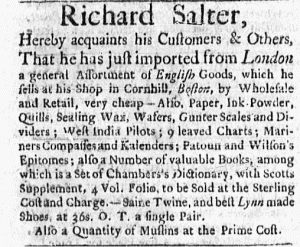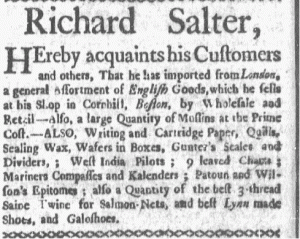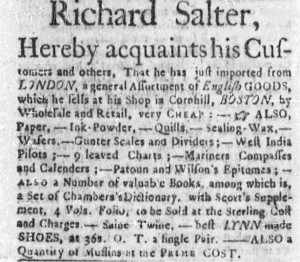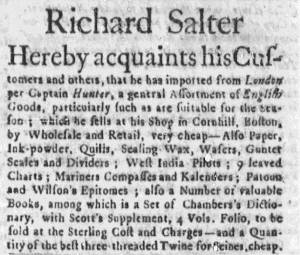GUEST CURATOR: Trevor Delp
What was advertised in a colonial newspaper 250 years ago today?

“West India Pilots; 9 leaved Charts; Mariners Compasses and Kalenders.”
Richard Salter’s advertisement in the Supplement to the Boston-Gazette gives a look into what was being sold in Boston during 1766. The goods advertised were “just imported from London” and to be sold at Salter’s shop in Boston “by Wholesale and Retail.” There was a great variety of goods being sold, from books to maritime instruments and even shoes.
Many of the items listed show the development of Boston’s economy and its successful port. One specific item in Salter’s advertisement I find interesting is the “West India Pilots.” This was a book published by Joseph Smith Speer an English mariner who spent many years in Central America and the Caribbean. The book contained thirteen maps and detailed instructions on how to navigate between Caribbean ports. A book like this would have been invaluable to merchants interested in trading in the Caribbean.
Items being sold this one, as well as paper, quills, and “Chambers Dictionary, with Scotts Supplement,” all allude to the growing literacy rate in Boston. An article published by Colonial Williamsburg explains how cities like Boston, by the end of the eighteenth century were approaching one hundred percent literacy rates. Advertisements like Salter’s helped push the colonies into the educational boom that transpired in the late eighteenth century and early nineteenth century.
**********
ADDITIONAL COMMENTARY: Carl Robert Keyes

Richard Salter wanted to make sure that potential customers in Boston and its hinterland saw his advertisement. While many advertisers were content with publishing their notices in just one of the four newspapers printed in Boston in 1766, Salter arranged to have his advertisement inserted in three of them, presumably at some cost. In addition to the advertisement Trevor chose from the Monday, March 3, 1766 issue of the Boston Evening-Post, a similar advertisement appeared in the Supplement to the Boston-Gazette on the same day. In addition, a nearly identical advertisement was also featured the previous Friday in the February 27 issue of the Supplement to the Massachusetts Gazette.

Only the Boston Post-Boy, also published on Mondays, neglected to print an advertisement from Salter during that week. Perhaps Salter could not afford to pay to advertise in yet another newspaper. Or, perhaps he figured that placing his advertisement in two of the three newspapers published on Monday gave him sufficient coverage of the market at the beginning of the week.
I am often asked if advertising actually worked in eighteenth-century America. Unfortunately, that is an extremely difficult question to answer. Early American consumers did not leave behind documents in which they explicitly stated that they did (or did not) make purchases based on advertising. Those who placed advertisements were more likely to comment that they believed in the effectiveness of their methods.

Salter’s multiple advertisements could be interpreted several ways. He may have placed them because they were indeed effective. Alternately, he may have placed so many of them out of sheer desperation, a last resort to move his merchandise out the door. I featured a nearly identical advertisement by Salter last December when this project existed exclusively on Twitter. Would Salter have placed this advertisement three months later (and in three newspapers!) if he did not believe it would garner new business? Although I believe that advertising incited consumer demand in the eighteenth century, examples like this one force me to consider the possible limits of marketing during the period.
